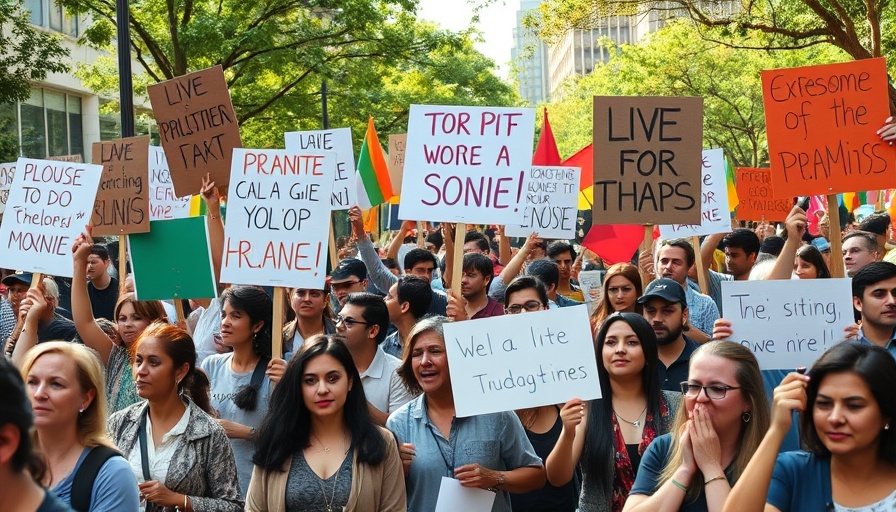
The Rise of the 'No Kings' Movement: Understanding Its Significance
On a significant day for dissent, the Tri-State area witnessed a wave of passionate protests under the banner of "No Kings." This movement, which echoes sentiments across the nation, has emerged in response to what many see as the egocentric tendencies of President Trump, coinciding with his birthday and a military parade in Washington, D.C. Protesters gathered in strong numbers, with estimates suggesting around 8,000 participants at a rally on the University of Cincinnati campus alone. From the chants that resonated, it's clear they are here to assert one critical message: democracy belongs to the people.
The Cultural Implications of Protest
This protest highlights more than just specific political grievances; it reveals a deep-seated cultural mentality that prioritizes community over individual power. By rallying together, participants are not only expressing dissent but reinforcing democratic values that advocate for equality and collective voice. Similar protests have been seen not only in local communities but also in cities across America, illustrating a common thread among citizens dissatisfied with leadership choices that seem disconnected from their needs.
Crossroads of Politics and Patriotism
Brandon Long, a participant from Campbell County, encapsulated the event’s atmosphere by stating, "This is not why I fought for this country," referring to his experience as a veteran. This sentiment brings forth the notion that protests serve as an intersection of patriotism and political dissent. Many military veterans view their service as a commitment to uphold the rights of citizens to voice their concerns — a stark reminder that protesting is itself an exercise of the freedom they fought to protect.
Historical Context: Protests as a Reflection of Democracy
Protesting has been an integral part of American democracy from its inception. Historic movements, whether it was the Civil Rights Movement or anti-war demonstrations, have shaped the landscape of the nation. The recent "No Kings" protests continue this tradition, acting as a lens through which to examine the current political climate. In each protest lies a story of resilience, community cooperation, and the relentless pursuit of justice and representation.
Visualizing Unity: Signs of Change
Visually striking moments at the protests such as signs calling for equality, justice, and a government that represents all citizens were prevalent. The sheer variety of people joining together—across various political affiliations and backgrounds—demonstrated a powerful community dynamic. That shared vision appeared palpable, bolstering the notion that despite political differences, the fundamental principle of democracy unites us all.
What Lies Ahead? Future of Political Dissent
Looking forward, these protests are likely to continue as citizens grow increasingly vocal about their frustrations with current leadership. The "No Kings" movement is more than just a reaction to one individual; it represents a broader call for accountability and a demand for a government that reflects the will of its people. As future elections loom larger on the horizon, expect these grassroots movements to harness even greater visibility and community mobilization.
With political moments like this, it’s crucial not only to participate but to remain informed and engaged in local and national dialogues about governance and representation. Understanding the significance behind every protest helps foster a more informed electorate.
 Add Row
Add Row  Add
Add 




Write A Comment